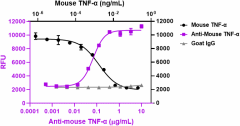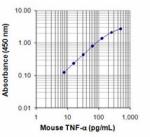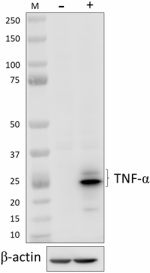- Clone
- Poly5160 (See other available formats)
- Regulatory Status
- RUO
- Other Names
- Tumor necrosis factor-α, Cachectin, Necrosin, Macrophage cytotoxic factor (MCF), Differentiation inducing factor (DIF), TNFSF-2
- Isotype
- Goat Polyclonal IgG
- Ave. Rating
- Submit a Review
- Product Citations
- publications

-

Recombinant mouse TNF-α (Cat. No. 575206) (black circles) cytotoxicity on 929L mouse musculus cells. LEAF™ purified anti-mouse/rat TNF-α antibody (Poly5160) (purple squares) neutralizes the cytotoxicity function of recombinant mouse TNF-α (Cat. No. 575206) at 0.04 ng/mL on 929L cells in a dose-dependent manner whereas the GoInVivo™ purified goat IgG isotype ctrl antibody (gray triangles) does not have the effect. ND50 range: 0.05 - 0.25 µg/mL. -

Whole cell extracts (15 µg protein) from RAW264.7 cells that were pre-treated with 300 ng/mL brefeldin A solution (Cat. No. 420601) for 3 hours and unstimulated (-) or stimulated (+) with 100 ng/mL LPS for 6 hours were resolved on a 4-12% Bis-Tris gel, transferred to a PVDF membrane, and probed with a 1:5000 dilution of LEAF™ purified anti-mouse/rat TNF-α antibody (Poly5160) overnight at 4°C. Proteins were visualized by chemiluminescence detection using HRP donkey anti-goat IgG antibody at a 1:10000 dilution. Equal protein loading was confirmed using HRP anti-β-actin antibody. Lane M: Molecular weight marker.
| Cat # | Size | Price | Quantity Check Availability | Save | ||
|---|---|---|---|---|---|---|
| 516005 | 100 µg | £301 | ||||
TNF-α is secreted by macrophages, monocytes, neutrophils, T-cells (principally CD4+), and NK-cells. Many transformed cell lines also secrete TNF-α. Monomeric mouse TNF-α is 156 amino acid protein (N-glycosylated) with a reported molecular weight of 17.5 kD protein. TNF-α forms multimeric complexes; stable trimers are most common in solution. A 26 kD membrane form of TNF-α has also been described. TNF-α binding to surface receptors elicits a wide array of biologic activities including: cytolysis and cytostasis of many tumor cell lines in vitro, hemorraghic necrosis of tumors in vivo, increased fibroblast proliferation, and enhanced chemotaxis and phagocytosis in neutrophils.
Product DetailsProduct Details
- Verified Reactivity
- Mouse, Rat
- Antibody Type
- Polyclonal
- Host Species
- Goat
- Immunogen
- Recombinant mouse TNF-α
- Formulation
- 0.2 µm filtered in phosphate-buffered solution, pH 7.2, containing no preservative.
- Endotoxin Level
- Less than 0.1 EU/µg of the protein (< 0.01 ng/µg of the protein) as determined by the LAL test.
- Preparation
- The LEAF™ (Low Endotoxin, Azide-Free) antibody was purified by affinity chromatography.
- Concentration
- The antibody is bottled at the concentration indicated on the vial. To obtain lot-specific concentration and expiration, please enter the lot number in our Certificate of Analysis online tool.
- Storage & Handling
- Upon receipt, store frozen at -20°C. Make small volume aliquots if needed and avoid repeated freeze-thaw cycles to prevent denaturing the antibody.
- Application
-
Neut - Quality tested
WB - Verified - Recommended Usage
-
Each lot of this antibody is quality control tested by neutralization of the cytotoxicity by recombinant mouse TNF-α (Cat. No. 575206) at 0.04 ng/mL on 929L mouse musculus cells. ND50 range: 0.05 - 0.25 µg/mL. For western blotting, the suggested use of this reagent is 0.1 - 1.0 µg/mL. It is recommended that the reagent be titrated for optimal performance for each application.
- RRID
-
AB_2892477 (BioLegend Cat. No. 516005)
Antigen Details
- Structure
- TNF superfamily; dimer/trimer; 18-150 kD (Mammalian).
- Distribution
-
Activated monocytes, neutrophils, macrophages, T cells, B cells, NK cells, LAK cells.
- Function
- Type II integral membrane protein processed by TACE for secretion; upregulated by interferons, IL-2, GM-CSF, substance P, bradykinin, PAF, immune complexes, cyclooxygenase; downregulated by IL-6, TGF-β, vitamin D3, prostaglandin E2, PAF antagonists.
- Interaction
- Monocytes, neutrophils, macrophages, T cells, fibroblasts, endothelial cells, osteoclasts, adipocytes, astroglia, microglia.
- Ligand/Receptor
- TNFRSF1A (TNF-R1, CD120a, TNFR-p60 Type β, p55); TNFRSF1B (TNF-R2, CD120b, TNFR-p80 Type A, p75).
- Cell Type
- B cells, Macrophages, Monocytes, Neutrophils, NK cells, T cells
- Biology Area
- Immunology
- Molecular Family
- Cytokines/Chemokines
- Antigen References
-
1. Fitzgerald K, et al. Eds. 2001. The Cytokine FactsBook. Academic Press, San Diego.
2. Beutler B, et al. 1988. Annu. Rev. Biochem. 57:505.
3. Beutler B, et al. 1989. Annu. Rev. Immunol. 7:625.
4. Tracey K, et al. 1993. Crit. Care Med. 21:S415. - Gene ID
- 21926 View all products for this Gene ID
- UniProt
- View information about TNF-alpha on UniProt.org
Related FAQs
- Do you guarantee that your antibodies are totally pathogen free?
-
BioLegend does not test for pathogens in-house aside from the GoInVivo™ product line. However, upon request, this can be tested on a custom basis with an outside, independent laboratory.
- Does BioLegend test each Ultra-LEAF™ antibody by functional assay?
-
No, BioLegend does not test Ultra-LEAF™ antibodies by functional assays unless otherwise indicated. Due to the possible complexities and variations of uses of biofunctional antibodies in different assays and because of the large product portfolio, BioLegend does not currently perform functional assays as a routine QC for the antibodies. However, we do provide references in which the antibodies were used for functional assays and we do perform QC to verify the specificity and quality of the antibody based on our strict specification criteria.
- Does BioLegend test each Ultra-LEAF™ antibody for potential pathogens?
-
No, BioLegend does not test for pathogens in-house unless otherwise indicated. However, we can recommend an outside vendor to perform this testing as needed.
- Have you tested this Ultra-LEAF™ antibody for in vivo or in vitro applications?
-
We don't test our antibodies for in vivo or in vitro applications unless otherwise indicated. Depending on the product, the TDS may describe literature supporting usage of a particular product for bioassay. It may be best to further consult the literature to find clone specific information.
Other Formats
View All TNF-α Reagents Request Custom Conjugation| Description | Clone | Applications |
|---|---|---|
| Biotin anti-mouse/rat TNF-α | Poly5160 | ELISA Detection |
| LEAF™ Purified anti-mouse/rat TNF-α | Poly5160 | Neut,WB |
Compare Data Across All Formats
This data display is provided for general comparisons between formats.
Your actual data may vary due to variations in samples, target cells, instruments and their settings, staining conditions, and other factors.
If you need assistance with selecting the best format contact our expert technical support team.
-
Biotin anti-mouse/rat TNF-α

-
LEAF™ Purified anti-mouse/rat TNF-α

Recombinant mouse TNF-α (Cat. No. 575206) (black circles) cy... 
Whole cell extracts (15 µg protein) from RAW264.7 cells that...
 Login / Register
Login / Register 










Follow Us